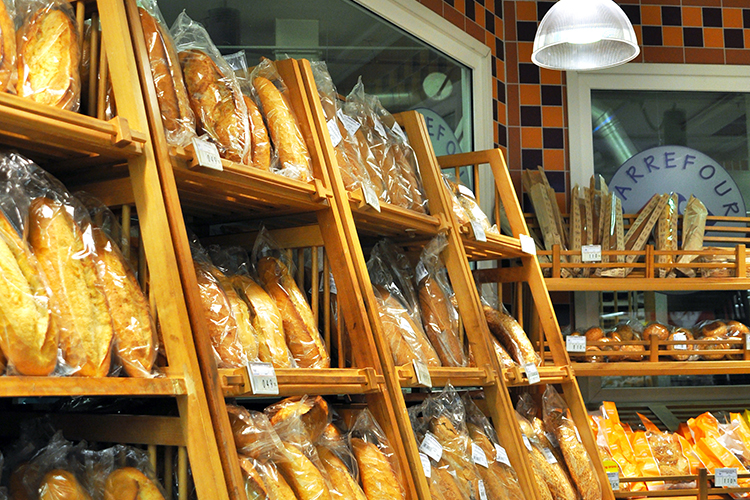2020 has been a year like no other, with few if any corners of the economy untouched by COVID-19. The baked goods industry is no exception.
Shoppers began passing up open-air bakery cases and bulk bins, for instance, opting instead for pre-packaged items they perceived as safer. Cake sales also fell in 2020, as social gatherings and other celebrations were reduced or canceled.
Packaged breads, however, were a big hit, as more and more Americans ate at home. And of course many consumers transformed into bakers themselves, with sourdough stealing the show (and making flour, sugar, yeast and other baking essentials hard to find in the grocery baking aisle).
 In 2020, there was also a big shift in how consumers shopped for baked goods, said JoAnn Rupp, global market insights manager for Lenexa, Kan.-based Corbion.
In 2020, there was also a big shift in how consumers shopped for baked goods, said JoAnn Rupp, global market insights manager for Lenexa, Kan.-based Corbion.
“It was the year of channel shifting, with consumers moving away from in-person shopping and making more of their purchases via e-commerce, click and collect and online retailers like Amazon,” Rupp said.
Other trends continued to gain steam in 2020, but, thanks to COVID, often in unexpected ways, Rupp said.
Take plant-based foods. They’ve been on the rise for some time, but in 2020, consumers looked beyond their natural qualities and focused instead on their immune health benefits.
Other foods that consumers looked to for wellness in 2020 included baked goods with seeds, grains, fruit and vegetable inclusions, and enhanced protein and vitamins, Rupp said.
The manufacturing impact
It isn’t just retail bakeries and groceries that have been affected by COVID-19, Rupp said. In 2020 the pandemic also had a big impact on manufacturers and their innovation efforts.
For many manufacturers, their focus shifted to responding to increases and decreases in distribution channels caused by major upheavals in supply and demand.
“Manufacturers had to pause their normal operations and ensure they had reliable systems in place that could guarantee their ability to obtain materials in the correct quantities from their suppliers,” Rupp said.
In 2021, expect manufacturers to continue grappling with the erosion of brand loyalty that occurred during the pandemic. Businesses will have to make tough decisions about which SKUs to reduce in order to streamline production, while still meeting consumer demands for new products.
“Though it may seem that private label brands seem poised to gain the most from this shift, we believe most manufacturers will be able to strike a balance between creating new products consumers will love and producing more recognizable ones that are associated with greater safety and security,” Rupp said.
Many consumers, she added, will just purchase whatever is available at their local store, regardless of the brand on the package.
Attention to detail
For Corbion, 2020 meant keeping a laser focus on identifying its customers’ needs on a deeper level, creating solutions that helped them deal with the new reality of day-to-day operations during a pandemic, Rupp said.
“We recognize that for many of them, things completely changed overnight, and they had to change how they ran their businesses.”
Building on some of the trends Corbion has seen in 2020, the company expects 2021 to be a big year for e-commerce and omnichannel shopping. Convenience will also continue to be key for consumers, as will value and food safety.
One change that will likely occur in 2021, Rupp said, is a decline in the consumer exploration of cultural cuisines and less innovation by the larger bakery brands.
Instead, look for greater focus on items that are most familiar to consumers — ones that invoke nostalgia, family and tradition.
Also, in response to changing consumer shopping habits, manufacturers will probably concentrate more on producing larger package sizes and items that can be stored for long periods of time, Rupp said. And production of on-the-go items, smaller packaging and miniature sizes will likely be reduced in favor of creating items that consumers view as necessities.
“Purchasing fresh bakery items will likely be eschewed in favor of fresh-but-frozen baked goods that can be used when it’s convenient for them,” Rupp said.
Lingering effects
Even with Americans starting to get vaccines, it’s likely that consumers will continue to forgo celebrations for a while, keeping cake sales low, Rupp said. And as the pandemic stretches on, many cooking-fatigued consumers will be searching for new, longer-lasting products that can help them add variety to their meals and reduce the amount of time needed to prepare food
In 2021, Corbion will be focused on providing vital support to its customers in order to help them be as efficient as possible in their operations, delivery of core products and navigating the ever-changing demands of consumers.
“Food quality will be more important, and we’ll focus efforts on improving texture and product preservation, including stability and flavor specialties,” Rupp said.
Clean-label foods continued their ascent in 2020 as more and more Americans focused on eating foods they thought offered health benefits. That will continue for many people in 2021, but for those whose finances suffered during the pandemic, Rupp said, buying clean-label has taken a backseat to stocking up on traditional staples.


